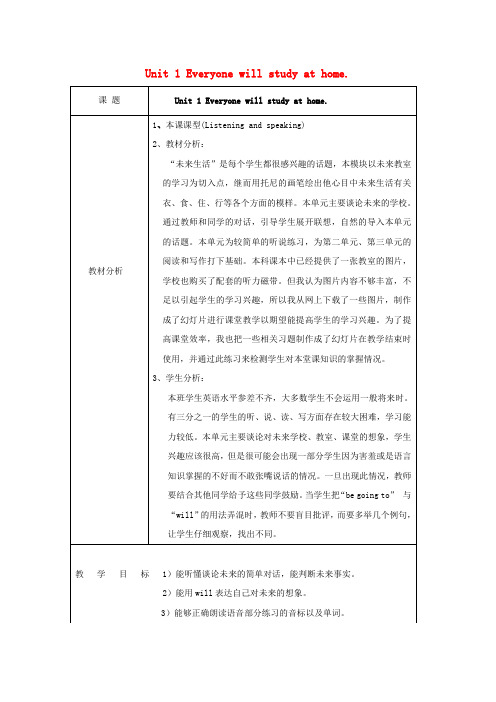【最新】外研版七年级英语下册《Module 4 Life in the future Unit 1》精品课件
- 格式:ppt
- 大小:5.56 MB
- 文档页数:9

Module4 Life in the futureUnit 1 Everyone will study at home.本单元以学校为题材,通过对未来的描述,掌握一般将来时的表达方式,同时表达自己对未来的设想,充分发挥想象力,通过对美好未来的憧憬,培养乐观向上的精神。
一.教材分析1.通过对第四模块的学习,学生已经学会使用be going to do 表示计划,安排作某事。
对一般将来时态有了一定的了解。
2.本模块以讲诉学校生活入手,对未来生活展开丰富的想象。
贴近学生生活,大部分学生会对本课产生浓厚的兴趣。
二.教学目标1.知识技能目标(1)词汇能够准确读出并写出cable TV, calculator, cell phone, computer, email, Internet, satellite, climate, education, technology, transport, machine,comfortable, rough, strong, expensive, smooth, dull 等单词;能准确读出technology 等词语。
(2)语法学习一般将来时will do的用法,(3) 技能能通过对本课对话的学习,使学生学会用将来时态表达对未来的设想。
2.情感目标用丰富的想象力预测未来的学校生活,培养乐观向上的精神。
3. 教学重点和难点一般将来时的用法和用一般将来时表达对未来的设想。
三.教学过程Step 1. lead-in:活动1:Ask and answer“What can you see in our classroom?” Ask the students to use the words to d escribe the classroom.[设计意图]:本活动为的是解决对话中出现的词汇障碍,为听对话作好准备,同时,通过对话题的讨论激活学生的背景知识,为听力理解做知识方面的铺垫。




Module 4 Life in the future交际用语。
谈论将来。
谈论未来。
谈论未来的学校。
描述未来的生活。
一般将来时。
will 。
形容词。
通过表达对未来的猜测和想象,激发学习热情,树立学习信心,培养运用英语的能力,把所学知识应用到生活中。
通过交际化语言的学习,增进同学间的友谊,培养自主学习和合作精神。
了解将来生活的巨大变化,刻苦学习,长大为祖国繁荣富强做贡献。
The future class ——未来课堂随着当今高科技的高速发展,人工智能的广泛应用,在很大程度上对教育产生了划时代的影响。
未来课堂也将会产生翻天覆地的变化,这也是我们所憧憬的,那么,它会是什么样的呢?●课堂环境未来课堂将以学生为中心,营造良好的物理环境和心理环境。
课堂环境的舒适与否是学生快乐学习的关键,将直接影响到学生是否能全面发展。
教室应当具有良好的采光、通风和照明条件,要保持舒适的温度和湿度,减少噪音污染;教室的物品摆放空间布局要合理、实用,教室的装饰和设计要色彩搭配协调,有助于学生健康。
●教学装备未来课堂提供了高科技的教与学设备,能够获取所需要的学习资源,然后进行处理和呈现。
LED 、电脑、电视、音响、投影、电子白板、移动互动终端、多屏互动终端得到广泛应用,大型的触摸液晶一体机是教学的必要装备。
同时,未来课堂中一切资源的存取与处理均在云端,师生可以通过云端的学习支持平台,实现资源互享,方便师生进行交流和解决学习问题。
●预习动画以生动有趣的预习动画开始,调动学生的学习兴趣,收到预习效果,为下一步的学习做好准备。
●课堂教学通过现代化技术设备进行正式的课堂教学,利用大数据平台提供更为优质的教学资源,在保证学生学习质量的同时,加强课堂趣味性和师生间互动,增强教师对学生知识掌握情况的准确把控。
●课后管理课后也不再是简单的完成作业,而是通过技术实现的教学系统,让教师在课后随时了解学生情况,解决学生疑问,对课堂教学进行良好的补充。

外研版英语七年级(下)Module 4 .Life in the future一.重点短语句型归纳。
1.in the future 将来in future 从今以后2.study at home 在家学习3. on the Internet 在网络上4.be able to 能、会5 .free time 空闲时间 6.as well 也﹙肯定句句末,前面无逗号﹚e true 实现8. all year﹙around﹚整年9.by email 通过电子邮件10.ask a question 问问题11.the change of weather天气的变化12.do light and easy work 做轻松简单的工作13、chalk、paper为不可数名词 a piece of+ chalk/paper 一支粉笔/一张纸14、in twenty years’time= in twenty years 在二十年后in +段时间,句子用一般将来时,用How soon提问15、use ... to do sth 使用...做某事use computer to get information16、get information on the Internet 从网上获得信息17. on the Internet 在网上18、by Internet 通过网络by telephone 通过电话方式by +交通工具单数乘坐by bus 乘公共汽车19、be able to do=can 能够做…20、not ...any more=no...more 不再...21、answer one’s question 回答某人的问题the answer to the question 问题的答案22、need to do sth 需要做某事need sth 需要…此时need是实义动词,有形式变need 做情态动词用时,后接动词原形,无形式变化。
M4 Life in the future1. life:名词,意为“生活,生命”He lives a happy life. 他过着幸福的生活。
Life is hard in that country. 那个国家里(人们)的生活很艰苦。
There are many forms of life on earth. 地球上的生命以多种形式存在。
2. chalk:名词,意为“粉笔”,为不可数名词,但叙述种类时,也可有复数形式。
some colored chalks3. paper:名词,意为“纸”,不可数名词;也可作“报纸、文件”讲,这时为可数名词。
Could you give me a piece of paper please?What news is there in the papers this morning?You always just talk on paper. No action at all.4. There will be a computer on every desk in the future.辨析:every,each,allThe teacher wants every student to succeed; however, each student will find his own personal road to succeed.老师希望每个学生都能成功,但每个学生都会找到他个人的成功之路。
____:指“各个”,以单个个体为主;____:相当于each and all,不仅指“每个”,而且概括全体;____:指“所有”,概括全体。
5. Will there be schools in the future?future:既可作名词,意为“________”,又可作形容词,意为“_________”。
The future is always unknown to us.The young man has a bright future as a doctor.Keep the book for future use.Our future home will be in London.辨析:in the future和in futureDo you want to go to America in the future? 你将来想去美国吗?I hope you’ll be careful in future. 我希望你今后仔细一些。
Module 4 Life in the future主题阅读(A)Life in the future will be different from life today, because many changes will take place in the new century, but what will the changes be?The population is 1 fast. There will be more and more people in the world and most of them will live 2 than before. 3 will be much smaller and more useful, and there will be at least one in every home. And computer studies will be one of the most important subjects at 4 .People will work fewer hours than they do today, and they will have more free time for sports,5 TV and travelling. Travelling will be6 . And much more people will go to other countries for holidays.There will be changes in our food, too. More land will be used for building new towns and houses. Then there will be less room for cows and sheep, so 7 will be more expensive. Maybe no one will eat it every day, 8 they eat more vegetables and fruit. Maybe people will be healthier.Work in the future will be 9 , too. Dangerous and hard work will be done by robots.10 this, many people will not have enough work to do. This will be a problem.1. A. making B. growing C. running D. doing2. A. longer B. shorter C. faster D. taller3. A. Trains B. CarsC. ComputersD. Houses4. A. factory B. hospitalC. farmD. school5. A. watching B. seeingC. lookingD. buying6. A. less interesting B. much easierC. more expensiveD. more difficult7. A. fruit B. vegetablesC. meatD. bread8. A. instead B. sometimesC. stillD. however9. A. dangerous B. difficultC. heavyD. different10. A. Thanks for B. Many thanksC. Because ofD. Because(B)My friend John has got a restaurant in a big city. It is near a supermarket. He gets ten robots for the restaurant. Each robot costs (价钱为)20,000 yuan. The restaurant is not big, but very popular. Now more and more people come here for dinner.The robots have different jobs in the restaurant. Two robots cook different kinds of food; one washes the dishes; one cleans the floor and the others give food to the guests(客人).Although robots do most of the jobs in the restaurant, John is still very busy. He must do many things to keep the robots working well. Luckily, John is good at studying robots and he knowsrobots very well. I think in the future, there will be a lot of robot-themed restaurants(机器人主题餐厅) around the world.1. Where is John’s restaurant?A. It is behind a park.B. It is next to a cinema.C. It is next to a supermarket.D. It is near a big bank.2. How many robots give food to the guests in the restaurant?A. Three.B. Four.C. Five.D. Six.3. What is John good at?A. Playing games.B. Studying robots.C. Cooking food.D. Making robots.4. From the passage we can learn ______.A. J ohn’s restaurant is in a small cityB. John is always free because of the robotsC. the robots cost John 200,000 yuanD. there are two robots sweeping the floor in therestaurant5. Which of the following is TRUE?A. The restaurant is big and clean.B. It is expensive to eat in the restaurant.C. There are three robot cooks(厨师) in therestaurant.D. Th e restaurant is popular in John’s city.。
外研版英语七年级下册Module4 Life in the future专题讲解Name:__________________本单元提纲1. 主题功能:能够谈论未来的生活2. 重点单词:change, ask, traffic, cheap, heavy, hour 等。
3. 重点短语:in the future, not...any more, on the internet, come true, heavy rain 等。
4. 核心句型:Will school be different in the future?Everyone will study at home.等。
语法结构:will结构的一般将来时重难点精讲Will school be different in the future?将来学校会不一样吗?本句是一般将来时的一般疑问句,结构为“will+主语+动词原形+其它?”。
该句式的答语有两种形式:肯定回答Yes,主语+will否定回答No,主语+won’t一般将来时表示的是未来的事情或者是对将来的预测,will没有人称和数的变化。
如果表示将来不会,就要用will not或者缩写成won’t。
题一:翻译:那边将会有一个大型的公园。
将来每张桌子上都会有一台电脑。
我想人人都将用电脑学习。
他们将不用课本。
学校里会有电脑吗?In the future意为“将来,未来”。
in the future 意为“将来”in future 意为“今后,以后”,相当于from now onIn twenty years’ time, maybe there won’t be any schools.在20年后,也许将不会有任何学校。
in twenty years’ time意为“在20年后”,其中years’是名词所有格结构。
在一般将来时中,“in+时间段”表示“在一段时间之后”。
题二:翻译:谁知道将来会发生什么事情?今后多注意你的拼写。